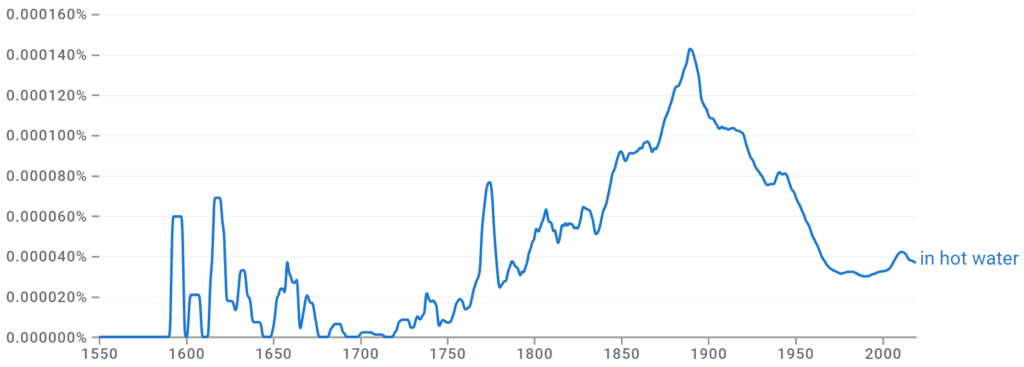The idiom in hot water means to be in trouble or be involved with something dangerously difficult. Its origins can be traced back to the idea of literally being in uncomfortably hot or boiling water—a clearly undesirable situation. For example, when my children forgot to do their chores, they were in hot water and had certain privileges taken away as a consequence.
Idioms are words and phrases used in a figurative sense. They are important expressions in the English language because they help create more detailed connections to an author’s message. Most idioms have a literal origin, but their usage has changed to be considered a figure of speech rather than taken at face value.
This article defines the use of this idiom, provides an explanation of its literal origins, and offers examples for you to learn from. Keep reading to understand how to incorporate this idiom into your own material.
Understanding ‘In Hot Water’ Idiom Meaning

The phrase “in hot water” is a colorful way to describe someone who is facing trouble, difficult circumstances, or repercussions for their actions. It represents various figurative scenarios where someone finds themselves in a challenging or problematic situation.
Although it’s possible to use this idiom in a literal context, such as someone accidentally stepping into a scalding bath, the idiom is more commonly applied in figurative contexts to describe social, legal, or personal predicaments.
For example:
- Her decision to skip class without permission could land her in serious hot water due to her poor attendance record.
- The bar’s failure to check proper IDs at the door put them in hot water with the law; their court date is later this month.
- The student’s poor conduct on social media sites landed him in hot water with the scholarship committee.
- I forgot our anniversary, so I’m really in hot water with my wife.
- If you keep skipping your homework, you’ll find yourself in hot water with the teacher.
- After losing the company’s data, Jake was in hot water with his boss.
In Hot Water Origins

The phrase “in hot water” was first used as an idiom in the 1530s, but the exact origin is uncertain. It may be simply related to cooking and the fact that something put into hot water is boiled. It may be related to a practice from medieval times in which an accused criminal or sinner (or witch) underwent an ordeal of having their arm plunged into boiling water; if the burn healed (considered divine intervention), they were deemed innocent.
Let’s Review
Even though we might not be sure where “in hot water” came from, people have been using this phrase for about 500 years to say someone’s in trouble. Idioms, like this one, add a bit of spice to our speech and writing. They paint a clearer picture, making it easier for others to grasp what we’re trying to say.
Check out some others we covered:
